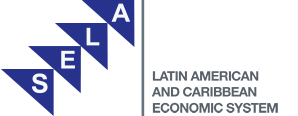BACKGROUND
MSMES represent a driving force for economic development, especially in the case of emerging economies. In terms of their contribution to international trade, it has been pointed out that they: i) form part of the value chain of large local exporters; ii) export products and services to more specialized market niches; iii) import and distribute products of foreign MSMEs; and iv) provide support services in the chain of international trade transactions (logistics, offices, etc.). In addition, they promote entrepreneurial activity, they foster innovation as well as diversification, and stimulate growth of employment. In Latin America and the Caribbean, MSMEs account for 90% of enterprises, generate more than half of jobs and one-quarter of countries’ GDP. However, they contribute little to exports and tend to specialize in products with low added value.
In addition to the difficulties experienced by MSMEs to gain access to financial systems, another obstacle restraining their development is the informal economy in which many of them operate. Hence, some governments in the region have outlined public policies to promote the formalization of MSMEs.
The concept of informality has evolved into the definition of informal economy. Given that informal labour is also present in registered MSMEs, the policies to promote formalization of MSMEs should make emphasis on the regulatory adjustments, on the incentives for their formalization, and on improving their capacity to comply with regulations.
The formalization process is one of the biggest obstacles faced by MSMEs due to the transaction costs of the process, the lack of advice, the traditional models of registration and the lack of incentives. An effective strategy for the formalization of these enterprises should combine measures to reduce regulatory burdens and the cost of formality, as well as incentives for their formalization and improvements in fiscal terms.
It has been determined that an effective strategy for the formalization of these companies must consider aspects such as economic growth with quality jobs, improving the regulatory environment, promoting social dialogue, organization and representation, promoting equality and the fight against discrimination, supporting entrepreneurship, developing professional skills and funding, and enhancing social protection as well as local economic development (ILO Regional Office for Latin America and the Caribbean).
In 2019, the Permanent Secretariat of SELA intends to convene focal points in charge of promoting MSMEs in SELA’s Member States, business associations and experts in the area to attend a Seminar-Workshop for reflection on the present and the future of the formalization of MSMEs in Latin America and the Caribbean, which will highlight the most significant experiences in this area. The Seminar-Workshop is scheduled to be held in February 2019, and will be organized by SELA jointly with the Ministry of Industry, Trade and MSMEs (MICM) of Dominican Republic.








